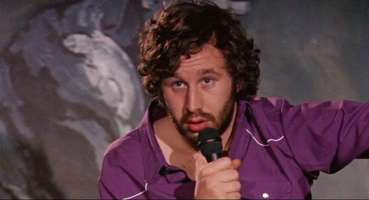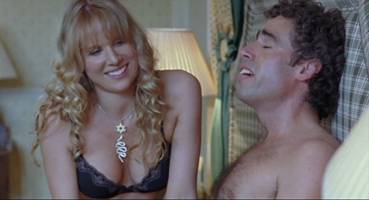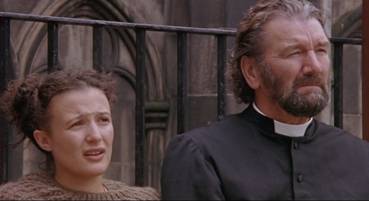"Fail
again, but fail better." |
Frida Finucane |
In
the past there have been a few cinematic stabs at capturing
the pain that can lie behind the brash front of professional
comedy and the nastiness of the media substructure that
supports and exploits it, but none have tackled the subject
as directly or successfully as Annie Griffin's first feature, Festival. Set and filmed at the Edinburgh
Festival, Griffin develops the comedy of embarrassment
elements of her TV series, The
Book Group, and draws on her own experience
performing at the festival in the 80s to create an
Altman-esque, multi-stranded examination of the sometimes
desperate underside of the desire for recognition through
comedy, at the same time offering a critique of the festival's
gradual shift from the dramatic to the comedic.
Central to the interlinked narratives is Sean Sullivan (Stephen Mangan),
a successful English comedian (known as "the man
of a thousand voices," a moniker he detests), who is on the
verge of a career in Hollywood and in town as a jury member
for the festival's annual Comedy Award (or Perrier Award
if you want a real life equivalent), a task he has no
real interest in performing. Likely a composite of various
British comedy talents rather than based on any one individual,
Sullivan is a self-centred shit of the highest order,
aggressively rude to just about everyone he encounters,
save for the women he instantly tries to talk into bed.
First in his sights on arrival in the city is Nicky Romanowski (Lucy Punch),
herself an aspiring comic on the road to building her
own ego and attitude, which soon creates further grief for Sullivan's
long-suffering PA, Petra (Raquel Cassidy). Also in town is weary Irish regular
Tommy O'Dwyer (Chris O'Dowd), fellow countryman and relative newcomer,
Conor Kelly (Billy Carter), diminutive Faith Myers (Lyndsey Marshal) with her one-woman
show on Dorothy Wordsworth ("Who's in it?" asks
a passer-by), and the towering figure of Brother Mike (Clive Russell) with his piece
on paedophile priests. A trio of Canadian actors (Megan Dodds, Meredith MacNeill and Jonah Lotan) arrive
in a fairyland daze at the house they have rented from
depressed landlady Micheline (Amelia Bullmore), who appears no longer able
to communicate with her wealthy lawyer husband or care
for her young daughter, and who starts to fixate on the idea of joining the
troupe and fleeing to Canada. And covering the event for
BBC Radio Scotland is Joan Gerard (Daniela Nardini), also a jury member
but one who has developed a cynicism for comedians and
the undue attention they command. It takes her only a few live broadcast questions to establish a hostile relationship with the sneering Sullivan.

Although
drawn together by circumstance, most of the characters
are dealing with issues that their interaction and conflict with their peers help bring to a head, a component
that the film uses to bind characters to each other, even
those who never actually cross paths. Tommy can barely
believe he has been coming to the festival for nine years
without official recognition and takes to chatting up
Joan Gerrard in the hope of securing an award nomination, but when she calls his bluff and drags him off to a hotel
for a quick shag, his alcohol fuelled terror of sexual
encounters immediately resurfaces. Joan, on the other
hand, appears to be looking merely for a diversion from
a job that she is increasingly frustrated by and a relationship
she clearly no longer finds fulfilling ("Why are
you always here?" she agitatedly asks boyfriend and
fellow jury member Dougie on returning home one day, only
to have him reply in bemusement "I live here –
it's my flat"). Petra, meanwhile, is an ex-alcoholic
who is almost driven back to drink by Sullivan's arrogant
insensitivity, but curiously seems unable to quit the
job, having replaced chemical abuse with an intellectual
one. Also fighting withdrawal symptoms is Brother Mike,
whose show seems less a fanciful creation than an attempt
at active redemption for his own past crimes. But while
Petra is saved from downfall by a chance meeting with
a kindred spirit, Mike sows the seeds for his own self-destruction
in a way that suggests that even the strongest
drug is no substitute for the destructive power of Catholic
guilt.
Griffin's
own voice is clearly evident both in Faith's go-it-alone
belief in the purpose of her play and Joan's heartfelt
rant against the comedy establishment and the increasing
dominance of stand-up over serious drama at the Festival.
But despite lampooning their self-absorbed pretentiousness
and relational fragility, Griffin aligns herself most
clearly with the Canadian trio. Arriving from afar all
agog at the city and its people and saddled with their own ludicrous
codes of communication, they nonetheless fill the theatre
for their performance and leave attendees Faith and Mike,
who have by then become friends, dazed at their brilliance. In
a film peppered with sometimes desperate stand-up comedy,
it is the sincere dramatists who really know how to connect
with an audience.
There's
an almost gleeful nastiness to the deconstruction of the
comedy fraternity, with characters driven almost exclusively
by opportunism and spite and no chance is missed
to show people at their mean-spirited worst. That such a damaged collection should find themselves in such close proximity may seem an exaggeration,
but Griffin has drawn them all from personal experience, and I can
certainly testify to the very real foundations from which
the characters have been built. Comedy based on hostile
conflict is always a tightrope walk, but Festival scores because, thanks
to a harmonic blend of script and performance and an editing
structure that times its location shifts to perfection, its people are all interesting.

Working
on Griffin's own philosophy that a character doesn't have
to be likeable for an audience to connect with them, Stephen
Mangan make Sullivan a fascinating and even oddly charismatic
figure that you nonetheless sometimes want to kick in
the nuts until his face turns purple. Yet even after his
vicious coup-de-grace at the climactic award ceremony,
you still manage to feel for him as he wanders wearily
back into his hotel (and believe me, by this point you
absolutely shouldn't). Chris O'Dowd works similar magic
with Tommy O'Dwyer, creating a selfish and somewhat pathetic man that
you still can't help rooting for, though putting him in
conflict with Sullivan inevitably shines a small light
behind his head, not least when he silences Sullivan's
mock-Irish piss-take at Tommy's own gig with the very
direct retort, "You're English. And you're a cunt."
The superb Lucy Punch finally gets to show her worth as
Nicky Romanowski, following her glorious tragi-comic
performance in Clara Glynn's 2001 short film It's
Not You. It's Me (do try and catch this if you
can), She also provides what in the cinema was the film's biggest
laugh-out-loud scene, as she cheerily delivers her Jewish
Mother monologue to Sullivan whilst giving him a hand-job
as he furiously tries to ignore her words ("Can we not
talk about mothers right now?") and fantasise about
Thai prostitutes instead. All of the main cast deliver, with Lyndsay
Marshall engagingly wide-eyed and innocent as Faith Myers,
Raquel Cassidy hitting just the right note of pathos as
the endlessly put-upon Petra, and Daniela Nardini making
for a convincingly and enjoyably cynical Joan.
Particularly noteworthy is the fun Griffin has with the
minor characters, from the pompously judgmental prejudices
of the jury members, who complain that Nicky is just pandering
for laughs ("She's a comedian!" retorts Sullivan
incredulously) or that there are no funny tall women ("The
cut-off is 5-7. She's two inches above funny"),
to the seen-it-all stage technicians and the overly eager
hotel receptionist (Gabriel Quigley), star-struck at the sight of Sullivan
but bemused when Joan and Tommy want a room for an hour
just for sex ("I'm not used to famous people," she cheerily bumbles, "I didn't know about the one hour thing"). The real
scene stealer, though, is Deirdre O'Kane as Irish jury
member Frida Finucane – fired up with enthusiasm at being
involved in such an event and darting back and forth to
Tommy with updates on the vote and misplaced words of
encouragement ("I know all of your material!"),
she is a smiling ball of excited energy who would not
be out of place guesting on Father Ted.
But
every now and again the blackly comic and even sad waters
part to reveal moments of almost startling gentleness,
most of which revolve around Canadian actor Rick and landlady
Micheline, with Rick's discovery of Micheline's kimono,
her hidden observation and imitation of his yoga exercises,
and their early morning walk and talk developing into
a story strand that offers a small glimmer of hope for this one lost soul. It is out of these scenes that the film's most
unexpectedly beautiful moment emerges, as Micheline climbs
a hill to both emotionally connect with happier times
and take a last look at her home city, and Jim Sutherland's
score, a heady mixture of bagpipes, wailing horns and
walk-to-the-gallows drums, gives way to a eye-wateringly
emotive Gaelic song.

Festival is not an easy sell, having none of the insufferably twee
romanticism and sell-it-to-America Englishness that has
made so many British comedy films of recent years so indigestible
to those of us with a more cynical world view. It's a cynicism that Festival has in abundance and which is
bound to alienate the happy-ending crowd and those with
even an ounce of prudery (I haven't even touched on the drunken
cunnilingus and anal fisting scenes). But as someone who
genuinely almost threw up at the climax of Notting
Hill, Festival is a breath of
the freshest Scottish mountain air, a gloriously barbed,
painfully witty look at a malicious side of the entertainment
industry that is long overdue for a cinematic arse kick.
The film's recent Best Film win at the British Comedy
Awards can be seen almost as ironic, given its own view
of the voting process, but is fully deserved. Indeed,
for my money Festival is the leading
contender for best British film of 2005.
Framed
1.85:1 and anamorphically enhanced, the transfer here
is good but a few notches short of great, with some scenes
having a slightly washed-out look to them, though elsewhere
contrast and colour are stronger. The picture is a tad
soft in places, but the documentary nature of much of the
footage, which was grabbed during the festival itself, is largely
responsible for this.
The
5.1 soundtrack is very nice, with sometimes excellent
separation of music and dialogue (in early scenes, music
sits at the back while dialogue and effects play at the
front) and buzz of crowds is often effectively inclusive.
There's
also an audio descriptive track, which has its moments
during the more explicit scenes ("He takes a quick
swig from a miniature bottle of liquor and gets down to
business," and so on).
I
know this is a bit odd, but I'd like to kick off by noting
what's not present and should be, and that's a commentary
by writer/director Annie Griffin. Her commentaries on series
1 of The Book Group were first rate, and this is a film that just demands that
level of background information. This is an opportunity
missed. Anyway, on to the bits that are there.
The
Making of Festival at the Festival (10:10)
is a making-of featurette that looks at the rehearsals,
character improvisations and on-the-street shooting. There's
some fascinating stuff in here, but it's WAY too short
– this should have run for at least an hour, and
in its present form almost feels like a trailer for the
real thing. I'm assuming this was an EPK sent out to promote
the film, and in that respect is way better than most,
but it does leave you aching for more. Shot on DV in anamorphic
widescreen.
There
are five Deleted Scenes, none
very long, some of which add character detail, but in
at least one case the removal is understandable. Funniest
is The Jury at Work, three minutes of cut jury
deliberations, most of which are as amusing as the material that made it into the film. These are non-anamorphic widescreen.
Bloopers (7:23) is a neatly edited mix of cut shots and gaffs,
presented non-anamorphic widescreen.
Development
Work Featurette (7:13) is another case of
a teaser for something that demands to be longer and have
some structure. Primarily containing what appears to be two
improvisations for scenes in the film, it suggests a Mike
Leigh-style approach to the dialogue, where actors play
off one another and the script emerges from that, but
no confirmation of this or explanation of what is taking place
is provided.
Bagpipes
and Cornetas Featurette (15:02) actually
feels complete and provides a structured and interesting
look at the recording of the score in Seville. No surprise
that it has camera and editing credits, though was clearly
shot on mini-DV and includes a few too many shots done
with the trace effect turned on (though some were presumably
enforced by low light levels). This one is anamorphic
widescreen.
Finally
there is the Theatrical Trailer (2:01), which is neatly assembled, though does suggest
this is a far more lightweight film than it actually is.
Festival has so remained a too-little seen film, though has managed
to seriously divide opinion amongst those who have caught
it, a couple of IMDB commentators describing it as the
worst film they've ever seen (but these days that's an all too common cry and applied to just about any film that doesn't strike the commentator as "awesome"). Certainly it's
not for everyone, but many of the film's detractors seem
to have either misinterpreted its intentions
(I've read a fair few moans that it's not a documentary-style
look at the Edinburgh Festival), been offended by its
content (and have then rather transparently made a point of
trying to convince us that they have not been) or complained
that the film is simply too cynical. TOO cynical? In my
book, there's no such thing. With that comment in mind,
it might be worth recalling the hundred-year-old words
of the great Ambrose Bierce, who described a cynic as
someone who "sees things as they are, not as they
should be." Enough said.
Pathé's
region 2 DVD features a pretty good transfer, very good
sound and a sprinkling of interesting extra features that
scream of incompletion, but with a special edition unlikely,
this will do well enough.
|